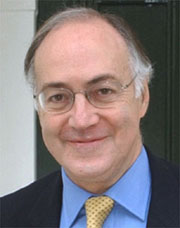|
 Britain's
struggling opposition Conservative Party
united after more than a decade of feuding
to make Michael Howard, a witty and
articulate former Cabinet minister,
its new leader. Britain's
struggling opposition Conservative Party
united after more than a decade of feuding
to make Michael Howard, a witty and
articulate former Cabinet minister,
its new leader.
Howard, 62, who stood unopposed to succeed Duncan Smith at
the helm of the once-mighty party, promised to "lead
from the center" to challenge Prime Minister Tony Blair's government.
"If we are to win we must work together as a team. We must
rediscover the virtues of mutual support and friendship," Howard
said in his acceptance speech.
"Our challenge is to build up ourselves as a credible and
appealing alternative government. Of course, it will be tough, uphill
work. The hard slog's only just beginning."
Sir Michael Spicer, chairman of the 1922 Committee representing
all Tory lawmakers, confirmed that no candidate had come forward
to challenge Howard by Thursday's deadline.
Senior Tories hope the Cambridge-educated lawyer will help the
party claw its way back up the opinion
polls. Wracked by feuds ever since Margaret
Thatcher was deposed as prime minister in 1990, the party
suffered crushing election defeats
in 1997 and 2001.
Despite Blair's difficulties over an unpopular U.S.-led war in
Iraq and discontent over domestic policy, the Conservatives continue
to trail the ruling Labor Party in
opinion polls.
"I think it is the beginning of the real resurgence
of Conservative fortunes," said Liam Fox, a Tory lawmaker and
Howard's campaign manager. "The government might rightly now
contemplate the end of their days."
Howard, who served as a junior minister
under Thatcher and as Britain's home affairs minister under John
Major, has warned the party it faces a long, steep climb.
"We have begun to renew our policies, but we are still only
in the foothills of our ascent. The
hard climb still lies head," he said after Duncan Smith was
ousted in a secret ballot last week.
The Tories dominated British politics for most of the 20th century,
most recently from 1979 to 1997.
Under Thatcher, who championed individual initiative and the free
market, the party commanded an unassailable majority in the House
of Commons, with 397 seats to Labor's 209 in the early 1980s.
But the party's popularity slipped throughout the 1990s, due to
an unpopular new local tax, internal feuding over European integration,
an economic recession and repeated
sleaze scandals which damaged its
credibility.
It has failed to recover from a landslide election defeat in 1997,
repeated in 2001, and now has only 165 seats in the Commons to Labor's
410.
Party membership has slumped massively
since the 1950s, when it stood at almost a million. Officials are
cagey about today's level, saying
it stands at more than 300,000.
Anthony Seldon, a historian and author of "Conservative Century,"
puts membership below 100,000 and notes that the average age of
party members is over 60. Howard was right "in saying it is
going to be a long, long road to climb," he said.
The party, seen by many as too right wing
and out of touch, is moving toward the center in the hope of winning
back voters who jumped ship to Labor in 1997. Labor was traditionally
a blue collar, working class party,
but under Blair it adopted many of the Tory's free market principles
and courted big business and the
middle class.
The Tory platform says they would cut government red
tape and hope to reduce taxes. The party opposes joining
the European single currency, says it will impose an annual quota
for refugees, recruit 40,000 extra police officers and help finance
treatment for people who choose private over state health care.
|
